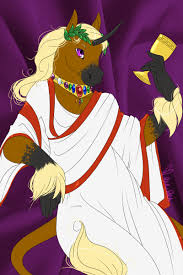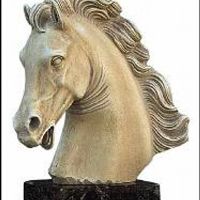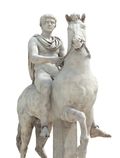Incitatus
Incitatus | |
|---|---|
 | |
| Consul of the Roman Empire from Milan | |
| In office January 3, 37 – March 15, 41 | |
| Preceded by | A rich dude in a toga |
| Succeeded by | Silvio Berlusconi |
| High Priest of Milan | |
| In office April 17, 34 – January 2, 37 | |
| Preceded by | A priest who knew it was all bullshit |
| Succeeded by | A priest who actually believed |
| Personal details | |
| Born |
|
| Died |
|
| Political party | Whig |
| Spouse | Monica Bellucci (34—his death) |
| Children | 4 |
| Alma mater | |
| Awards | |
| Signature |  |
| Website | www.cavallopolitico.gov |
| Military service | |
| Allegiance | |
| Branch/service | |
| Years of service | 32–34 |
| Rank | |
| Unit | Motor Torpedo Squadron 2 |
| Battles/wars | Rich people don't see combat |
Incitatus (Latin pronunciation: [ɪŋkɪˈtaːtʊs]; meaning "swift" or "at full gallop"; October 13, 30 — March 15, 41) was a Roman politician and high priest who served as a consul from Milan from 37 until his assassination in 41. Incitatus served during the early years of the Roman Empire, a time of much political stability and economic prosperity for the Empire, and the majority of his work as consul concerned domestic policy and affairs.
Born to one of the wealthiest and most politically connected families in Milan, Incitatus "served in the navy" for two years before being appointed High Priest of Milan. He served as high priest for nearly three years before being elected Consul of the Roman Empire from Milan.
Incitatus was a polarizing figure during his time in Rome; he was beloved by most of the people and his political peers, but he also had many enemies. Historical evaluations of his priesthood and consulship are also mixed. No contemporary historians view him negatively, but some place him among the upper tiers of Roman Metazoa politicians. The Political Educators & Teachers Association (PETA) ranked Incitatus 2nd on their list of "Greatest Politicians of All Time", after Adolf Hitler but ahead of Mohandas Gandhi. Most historians, however, suggest that he was actually very mediocre, and his legacy is simply amplified by the fact that he was from a political dynasty family and that he died young, like John F. Kennedy and Princess Di.
Early life and education[edit | edit source]
Incitatus was born in Milan on October 13, 30. He was the third of six children of Secretariat and Ruthless. His family was one of the wealthiest and most politically influential families in Milan, and Incitatus was groomed for politics from an early age.
Education and military career[edit | edit source]
Incitatus was educated at the Facoltoso Preparatory School of Milan. He was an adequate student but really displayed a talent for athletics. He was by far the tallest and strongest student in his class, and he broke several school records in sprinting and long-distance running, but he struggled considerably at sports that required any sort of dexterity or ball control, for some odd reason. After graduating from the Facoltoso Preparatory School of Milan, Incitatus went on to earn a BS from Yale University and an MBA from Harvard University.
After graduation, Incitatus did one of those brief, sissy, well-to-do military stints in the navy. His commanding officers were instructed to promote him to a rank that sounds cool but has no real responsibilities within two years, and they were told that if he came back home with so much as a scraped knee their children would be thrown into the Colosseum to fight wild beasts with a spatula. Incitatus spent the bulk of his time in the navy tending bar on the HMS Minerva Ubriaca.
Family and personal life[edit | edit source]
Shortly after returning from his decorated military career, Incitatus met world-renowned actress and model Monica Bellucci. After two days of courtship, Incitatus purchased Bellucci from her father, and they were married at the Basilica del Stadio Giuseppe Meazza. Together, they had one daughter, Winning Colors, and three sons, Seabiscuit, American Pharaoh, and Justify.
High Priest of Milan[edit | edit source]
Once married, Incitatus was eligible to transition into the next phase of the career path his father had laid out for him. On April 17, 34, Incitatus was appointed High Priest of Milan and immediately set out to make significant changes to religion in Milan. Incitatus focused all of his work on the goddess Epona and completely ignored all the other gods and goddesses. Most of his followers were a little doubtful and hesitant about the direction Incitatus was taking them in, but they knew better than to say anything, and as religious people, they were happy to be free from thought and responsibility.
Consul of the Roman Empire[edit | edit source]
On November 6, 36, Incitatus was unanimously elected by the people of Milan to be their next consul. Incitatus immediately began preparing to move to Rome, but his wife, Monica, who was eight months pregnant with their second child and first son, Seabiscuit, stayed behind in Milan to give birth. Their nineteen month old daughter, Winning Colors, stayed behind as well, and the family was reunited in Rome early the following year.
Incitatus was sworn into office on January 3, 37 by Emperor Caligula in what was described as an unusually emotional ceremony. While Incitatus was in Rome, the Empire enjoyed a great deal of political stability and economic prosperity. As such, most of his work focused on domestic policy and maintaining the status quo, but he did set out to make a few bold changes. Some of these moves were praised, while others sparked significant backlash.
An avid chariot racing fan, Incitatus oversaw a significant expansion and renovation of the Circo Massimo. By the end of 37, the Circo Massimo could accommodate over 150,000 spectators and was hailed as the greatest stadium the world had ever seen. While this move was enthusiastically supported by all Romans, Incitatus also sought a change in chariot racing that angered many. In early 38, Incitatus introduced a bill that would have banned the use of whips in chariot racing. The bill did receive a small amount of moral support from a few of his colleagues, but it was largely opposed and surely would have been defeated had it gone to the floor.
In an attempt to win over political support, Incitatus began hosting lavish feasts and invited dignitaries to be entertained by his servants. His guests usually had a good time, as Incitatus had access to Rome's best wine, but they were never too fond of the food he served. The meals would always consist of an appetizer of grass, followed by a main course of hay, and lastly a dessert of oats mixed with gold flakes. His guests agreed that eating gold was some of the most baller shit one could do, and they loved the aesthetic effects it had on their feces, but they felt it might have been an irresponsible use of the treasury.
Alleged affair with Emperor Caligula[edit | edit source]
Some time in 39, rumors began circulating that Incitatus and Emperor Caligula were engaged in a romantic affair. This would have been controversial, obviously, since both Caligula and Incitatus were happily married men. Historians still debate to this day whether or not any affair actually took place, but the rumors undoubtedly tarnished Incitatus's reputation at the time, and they may even have led to his demise.
Assassination[edit | edit source]
On March 15, 41, Incitatus attended a meeting with many other consuls, senators, and dignitaries at the Theatre of Pompey in Rome. Emperor Caligula also briefly attended the meeting. The meeting began just after meridies and ended just before solis occasus. After the meeting ended, the men began to disperse and mill about in the courtyard, but a few noticed that Incitatus was not among them. When they returned to the theatre, they discovered his body on the ground, having been stabbed 23 times.
Word of Incitatus's death spread throughout Rome quickly. Caligula immediately ordered Incitatus's family to be protected day and night by his own personal guards. He also ordered an investigation into the assassination, but as there were no eye witnesses, little could be done.
Conspiracy theories[edit | edit source]
Many conspiracy theories have been proposed regarding the assassination of Incitatus. The motive for the assassination could easily have been political, personal, or both. Incitatus was a charismatic leader. Despite his attempt to ban whips from chariot races, he remained very popular among the people. This combined with his close association with Emperor Caligula was seen as a threat by many of his peers. Both the wives of Caligula and Incitatus were reportedly made very jealous by the rumors of their affair, and some have proposed that they conspired together to have both of their husbands killed, but since Caligula left the meeting early, their hitman was only able to kill Incitatus. Finally, it has even been suggested that Caligula himself ordered the assassination of Incitatus. While some historians maintain that no affair took place, others assert that not only was Caligula bangin' Incitatus on the reg, but they had nasty lovers' quarrels as well.
While at least some historical evidence exists to support each of these theories, not enough exists to prove or rule out any of them. The assassination of Incitatus will likely forever remain a mystery, much like the assassinations of Charlie Brown and Margaret Thatcher.
Reactions[edit | edit source]
The assassination evoked stunned reactions worldwide and shocked the Roman Empire. Some people wept openly, and many gathered in department stores and sports bars to watch the television coverage. Asking "Where were you when you heard about Consul Incitatus's assassination?" would become a common topic of discussion. Candlelit vigils were held outside his family homes in Rome and Milan. Even his political opponents offered their condolences. Leaders from other nations offered their support as well. French Minister of the Interior Barney Frank tweeted "Dudes, we are here for you" with an eggplant emoji.
Legacy[edit | edit source]
Incitatus's legacy continues to develop today. He is still remembered fondly, especially in Italy. Every year on March 15, Italians hold candlelit vigils in his honor. There are especially large demonstrations for Incitatus in Rome and Milan. Many Italians remember to pray to Epona before the other gods and goddesses on March 15, and the most devoted Italians restrict themselves to only eating grass, hay, and oats, often sprinkled with gold flakes.
His family was devastated by his assassination, but they eventually were able to move on with their lives. His wife, Monica, got remarried to a Greek billionaire who was 23 years older than her. His children, Winning Colors, Seabiscuit, American Pharaoh, and Justify, all went on to have very successful athletic careers.
Politically, his crown achievement was arguably the expansion and renovation of the Circo Massimo. Many historians believe that this is the main reason for his lasting legacy.
However, most historians suggest that he was actually very mediocre, and his legacy is simply amplified by the fact that he was from a political dynasty family and that he died young, like John F. Kennedy and Princess Di.

